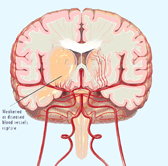What is stroke?
Stroke is a condition whereby blood vessel to the brain is blocked or ruptured. Thebrain tissue gets damaged because of lack of oxygen. When that part of brain tissue dies the function of that brain tissue will be lost. Among the main symptoms are fainting, unconsciousness and/or weakness of limbs. Stroke is a devastating illness causing severe disability. Hospital records show a progressive increase in stroke and death due to stroke at government hospitals. In Kuala Lumpur Hospital, 1000 stroke cases are seen per year with 30% – 35%, deaths due to stroke. The World Health Organization estimates that in 2001 there were over 20.5 million strokes worldwide, 5.5 million of these were fatal.
What causes stroke?
Blood is brought to the brain by blood vessels called arteries. Thrombotic/ischaemic stroke occurs when an artery to the brain is blocked. Haemorrhagic stroke occurs when an artery to the brain bursts.
What are risk factors for stroke?
Risks factors for getting stroke that cannot be modified are :
- Age – the older you are, especially above 65, you are at higher risk to get stroke
- Gender- Men are at slightly higher risk to get stroke than women.
- Family history – A higher risk exists if you or your family has had a stroke or minor stroke (transient ischemic attack).
The modifiable factors that increase your risk of getting stroke are :
- High blood pressure
- Diabetes
- High blood cholesterol level
- Smoking
- Overweight
- Sedentary lifestyle
- Stress
- Diet – low fibre high fat diet
- Alcoho – heavy drinking
How do I know if I have stroke?
When you experience one or more of those symptoms, consult your health care provider or go to the nearest health facility immediately. The doctor will confirm your symptoms and do certain examination and tests. The doctor will diagnose whether you have stroke based on those findings.
What are the symptoms of stroke?
Symptoms of stroke appear suddenly and can include :
- Sudden unexplained tingling and/or numbness on side of the body.
- Sudden weakness or paralysis of the face, arm or leg.
- Sudden confusion, trouble in talking or understanding people speech.
- Sudden severe headache with no obvious cause
- Sudden poor vision in one or both eyes.
- Sudden trouble in walking, dizziness or loss of balance or coordination.
- Difficulty in swallowing.
How many types of stroke?
There are two main types of stroke :
- Thrombotic/ischaemic stroke
- occurs when an artery to the brain is blocked.

- Haemorrhagic stroke
- occurs when an artery to the brain is burst.

What are the treatment for stroke?
The person with a stroke will need to be :
- Admitted to hospital to know the cause of the stroke and how extent the brain has been damaged.
- Treated with medicines.
- An operation is sometimes necessary to stop bleeding or remove blood clot.
- Started on a rehabilitation programme as soon as possible, such as exercises to build up his strength, speech training and lessons on how to carry out his daily activities.
- Given advice about healthy diet.
Can I prevent stroke from happening?
Yes! The risk of stroke can be reduced by :
- Control your blood pressure
- Control your high blood cholesterol
- Control your diabetes
- Practise healthy Eating
- Stop smoking
- Exercise regularly
- Manage your stress better
- Lower your alcohol intake
Rehabilitation for stroke patient
The effect of a small stroke can be overcome, but in other cases, the disabilities are severe and permanent. So, support and understanding from family, friends, and intensive rehabilitation from health care professionals, can always improve quality og life of stroke patients. The health care professionals who can help in rehabilitative process are :
- Speech therapist
- to maintain or improve speech and communication and assess swallowing difficulties.
- Occupational therapist
- to teach coping strategies and new skills and help adapt the family home to better cater for the need of a stroke patient.
- Physiotherapist
- to maintain or improve the movement and functioning of the body
What is the support group available for stroke patients?
- Nasam – National Stroke Association of Malaysia
| Last reviewed | : | 26 April 2012 |
| Writer | : | Dr. A. Khalek Abd. Rahman |
| Reviewer | : | Dato’ Dr. Hj. Hanip b. Rafia |







